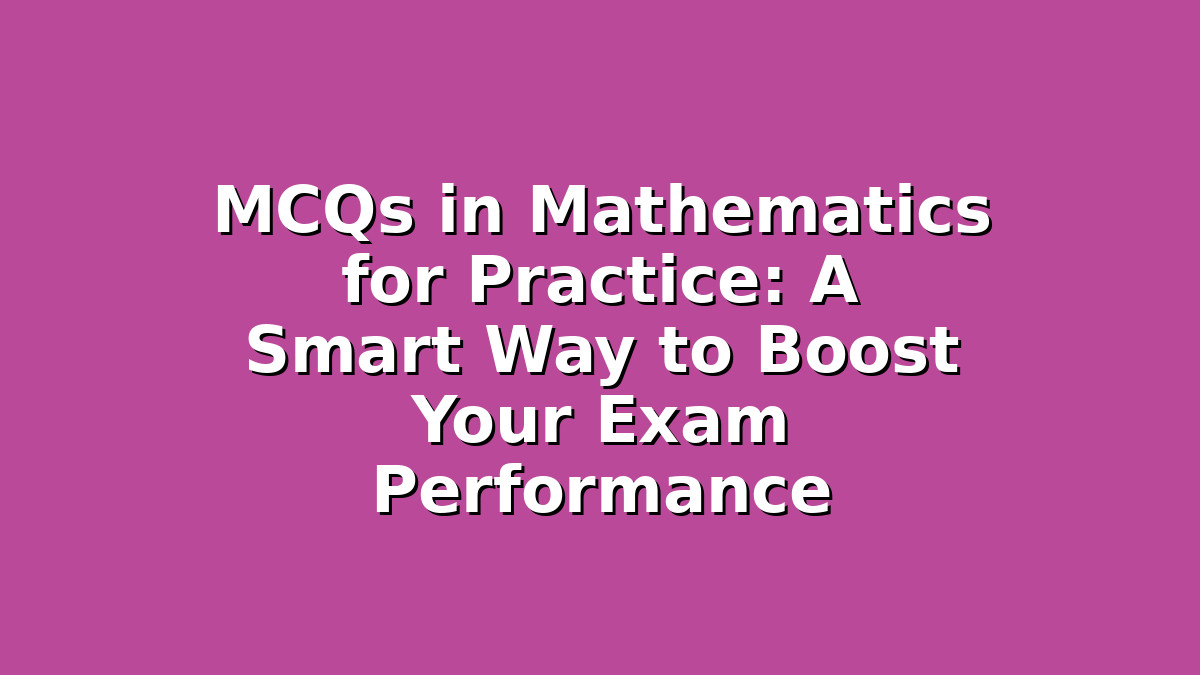Mathematics is a subject that challenges many students, but with the right strategies, mastering it becomes much easier and even enjoyable. One of the most effective tools for learning and revision is practicing Multiple Choice Questions (MCQs). Whether you are preparing for school exams, competitive tests, or standardized assessments, incorporating MCQs into your study routine can significantly improve your understanding and confidence.
In this article, we will explore why MCQs are important for practicing mathematics, how to approach them effectively, and some study tips to maximize your results. By the end, you’ll be motivated to include MCQs in your study plan and equipped with strategies to get the most out of them.
Why Practicing MCQs in Mathematics is Essential
Multiple Choice Questions are more than just a test format—they are a powerful learning tool. Here’s why MCQs play a crucial role in math preparation:
1. Instant Feedback and Self-Assessment
When you practice MCQs, you get immediate feedback on what you know and where you need improvement. Since MCQs have clear right or wrong answers, they help you quickly identify gaps in your understanding, allowing you to focus your study efforts more efficiently.
2. Enhances Conceptual Clarity
Math MCQs often test fundamental concepts in various ways. By working through different types of questions, you reinforce your grasp on key formulas, theorems, and problem-solving techniques. This variety also prepares you for the unpredictable nature of exam questions.
3. Improves Time Management and Exam Strategy
Timed MCQ practice helps you get used to answering questions quickly and accurately. This skill is crucial in exams with strict time limits. Additionally, MCQs teach you how to eliminate wrong options, make educated guesses, and prioritize questions, all valuable exam strategies.
Section 1: How to Use MCQs Effectively in Your Math Study Routine
Incorporating MCQ practice into your study sessions requires thoughtful planning. Here are some tips to make your MCQ practice sessions more productive:
– Start with Topics You Find Difficult
Begin by focusing on areas where you struggle the most. For example, if algebraic expressions or geometry problems confuse you, select MCQs covering those topics. This targeted practice helps build confidence and reduces exam anxiety.
– Use Quality Resources
Make sure to use MCQs from reliable sources such as your textbook, past examination papers, or trusted online platforms. High-quality questions are designed to test your understanding rather than just rote memorization.
– Practice Regularly but in Batches
Rather than attempting large sets of questions in one go, break your practice into smaller sessions focusing on specific topics. This approach prevents burnout and aids better retention.
– Analyze Every Mistake
Don’t just mark answers as right or wrong—review explanations for incorrect responses. Understanding why a particular answer is wrong is crucial for correcting misconceptions and avoiding repeated mistakes.
Section 2: Tips for Solving Math MCQs with Confidence
Answering MCQs correctly requires more than just knowing the material—it demands a strategic mindset. Here’s how to enhance your problem-solving skills for MCQs:
– Read the Question Carefully
Many students lose marks by rushing through questions and missing key details. Take the time to understand what the question asks, especially in word problems or multi-step questions.
– Eliminate Obviously Wrong Options
Use the process of elimination to narrow down choices. Even if you are unsure of the correct answer, removing one or two wrong options increases your chances if you need to guess.
– Watch Out for Traps and Common Pitfalls
Some MCQs include options designed to trick careless readers. Be cautious with common traps such as sign errors, misread values, or overlooked units. Double-check your work before selecting an answer.
– Use Rough Work Efficiently
Don’t hesitate to do calculations on scratch paper. Writing down intermediate steps helps avoid careless mistakes and boosts accuracy, especially in complex problems.
– Manage Your Time Wisely
Avoid spending too long on a single question. If stuck, mark it and move on; you can return later if time permits. Prioritizing simpler questions ensures you secure easy marks first.
Section 3: Benefits of Integrating MCQs into Group Study and Digital Platforms
Studying with peers and using digital resources can further enhance your MCQ practice:
– Group Study for Collaborative Learning
Solving MCQs together encourages discussion and explanation of concepts. Hearing different approaches to the same problem deepens understanding and exposes you to new strategies.
– Gamified Learning Apps and Online Quizzes
There are many apps and websites dedicated to math MCQs that offer interactive quizzes, leaderboards, and progress tracking. These tools make studying fun and motivate you to maintain consistent practice.
– Mock Tests to Simulate Exam Conditions
Taking full-length MCQ-based mock tests under timed conditions helps build stamina and reduces exam day nervousness. Review your mock test results thoroughly to fine-tune your preparation.
– Instant Performance Analytics
Many digital platforms provide detailed analytics on topics where you excel or need improvement. Use this data to customize your study plan and focus on weak areas.
Conclusion
MCQs are a versatile and effective way to practice mathematics for exams. They provide immediate feedback, enhance your understanding, and help develop critical exam skills such as time management and strategic guessing. By selecting quality MCQs, practicing regularly, analyzing your mistakes, and using smart techniques during exams, you can significantly boost your math performance.
Remember, consistent practice with MCQs not only prepares you for the exam but also builds confidence and reduces anxiety. Combine solo practice with group discussions and utilize digital tools for a comprehensive study approach. Stay positive, keep practicing, and watch your math skills grow stronger every day!
Good luck with your studies!

Responses